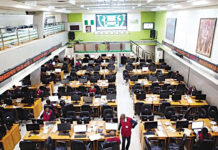Ecobank Transnational Incorporated (ETI) has reported a significant increase in its profit after tax, reaching N311 billion for the first half of 2024. This marks a remarkable 196 percent rise compared to the N105 billion recorded in the same period last year. The impressive growth reflects the bank’s strong performance across multiple financial metrics.

According to Ecobank Group’s performance report for the first six months of 2024, the bank’s revenue surged by 186 percent, climbing to N1.36 trillion from N475.65 billion in the first half of 2023. This revenue growth was driven by higher interest income and non-interest revenue, indicating the bank’s successful strategies in capitalizing on market opportunities.
The bank’s operating profit before impairment charges also saw a significant boost, reaching N631.5 billion, a 215 percent increase from N200.77 billion reported in the previous year. This growth was fueled by robust increases in both interest income and non-interest income, highlighting the bank’s ability to generate substantial earnings from its core banking operations.
Ecobank’s total income for the first half of 2024 rose by 175 percent to N1.23 trillion, up from N445.9 billion in the corresponding period of the previous year. This increase was largely attributed to higher yields on loans and advances, as well as investment securities, which contributed to the bank’s overall financial strength.
In addition to these gains, the bank reported a significant rise in fee and commission income, which grew by 186 percent to N384.1 billion, compared to N134.38 billion in the previous year. This growth was driven by increased transaction volumes and enhanced service offerings, reflecting the bank’s expanding customer base and diversified revenue streams.
However, not all metrics showed positive growth. Ecobank’s trading income and foreign exchange gains fell by 20 percent, decreasing to N230.31 billion from N209.45 billion in the previous year. This decline suggests challenges in the bank’s trading activities, possibly due to market volatility or changes in foreign exchange rates.
Moreover, the bank recorded a net investment income loss of N941.51 million, a sharp contrast to the gain of N2.27 billion in the first half of 2023. This loss indicates that some of the bank’s investment strategies did not yield the expected returns during the period.
On the cost side, Ecobank’s operating expenses rose significantly by 165 percent to N728.73 billion, up from N274.88 billion in the previous year. This increase was mainly due to higher staff costs and depreciation, reflecting the bank’s ongoing investments in its workforce and infrastructure.
Impairment charges on financial assets also surged by 273 percent to N188 billion, compared to N50.46 billion in the first half of 2023. This sharp rise was attributed to heightened credit risk and cautious provisioning, signaling the bank’s prudent approach in managing potential losses.
Tax expenses followed the upward trend, increasing by 194 percent to N132.49 billion from N45.09 billion last year. This rise aligns with the higher profit before tax, demonstrating the bank’s substantial earnings growth.
Ecobank’s total assets grew by 49 percent, reaching N38.6 trillion as of June 2024, up from N25.92 trillion in December 2023. This growth was driven by a rise in customer deposits and investment securities, with deposits from customers increasing by 49 percent to N28.26 trillion, compared to N19.01 trillion at the end of the previous year.
Despite these gains, the bank’s total equity decreased by 13 percent to N2.25 trillion, down from N1.65 trillion in December 2023. This decline was mainly due to exchange rate fluctuations, which negatively impacted retained earnings and reserves.
Earnings per share saw a significant increase, rising by 175 percent to 878 kobo, up from 319 kobo in the first half of 2023. Overall, ETI’s profit after tax grew by 11 percent year-on-year, reaching $407 million in 2023, up from $367 million in 2022.
This strong financial performance underscores Ecobank’s resilience and adaptability in a challenging economic environment, positioning it for continued growth in the future.




